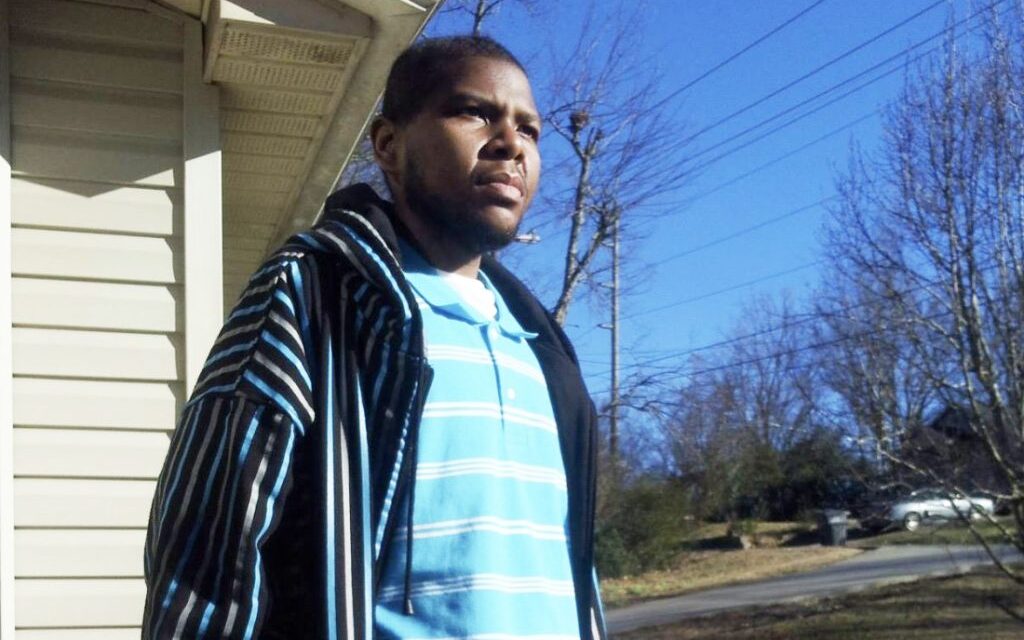Erica Martin’s 16-year-old daughter loves to play the French Horn in her Opelika school band. But after Alabama demanded back $15,000 of the pandemic unemployment it paid Martin, she could barely pay the rent, let alone afford band fees.
“She was like, ‘Oh I’ve got band practice,’ and I had to sit her down and tell her I didn’t have it,” said Martin of the $400 the band cost.
Martin’s unemployment application was approved after her kids were sent home for virtual school in the spring of 2020. She is one of thousands of Alabamians who got paid unemployment during the pandemic, only to learn from the state that they’ve been “overpaid” and now owe money back.
Alabama reported overpaying over $164 million in unemployment in 2020 and 2021, according to data from the U.S. Department of Labor.
The overpayments, which occurred in many states, are often the result of small mistakes. Instead of being addressed, the problems go unreviewed and appeals are not heard, according to a lawsuit brought against the department by Legal Services Alabama that asks a judge to require the department to improve its processes and ensure people get hearings on complaints within 30 days.
And people who feel they are now being billed in error say they can’t get anyone on the phone.
Melissa Fass, 35, worked at the store at the Space and Rocket Center before getting laid off in the pandemic. It took her a few months to get her unemployment application approved and she was on assistance for over a year before moving to Florida and starting work as a computer tech.
Last year she got a letter saying she owed Alabama $1,200. She appealed twice but didn’t hear back. She said she tried calling the department many times.
“You could never get through. Every time I try to call it, you just can’t get through,” she said, as she logged in to her account to check on its status. As Fass spoke with AL.com, she noticed that the overpayment amount in her account had increased to $20,000.
“I’m in utter shock,” she said several times. “(This) would affect me greatly, it would leave me with nothing.”
Never caught up
During the pandemic, the federal government paid hundreds of billions of dollars to states to pay people an extra $600 of unemployment money per week. An estimated quarter of Americans were on unemployment at some point in the pandemic, according to The Century Foundation.
But because the government’s response was set up so quickly to the crisis created by the pandemic, and because the amount of money given to Americans was unprecedented, state agencies were understaffed, and errors happened more often, said Jenna Gerry, a senior attorney at the National Employment Law Project.
“It led to a lot of confusion and mistakes that now are leading to these really harmful overpayment waivers which are asking people to pay back hundreds, thousands of dollars, based on stuff that was not their mistake, (and) really was due to agency error and confusion.”
Alabama has never fully caught up with the rush from 2020.
Alabama saw a whopping 580 percent increase in claims between May of 2019 and May of 2020, the department stated in a filing in a lawsuit. Alabama received 1,462,344 unemployment claims since April of 2020 and 1,108,514 were COVID related, according to the Department of Labor.
Yet two years later, as of April 2022, over 12,000 appeals still have not been heard.
And wait times in Alabama were longer than anywhere else in the country in 2021, according to The Century Foundation’s analysis of federal data from August of last year. In Alabama, the average appeal case was pending 566 days at the Department of Labor, nearly twice as long as the second-most delayed state, Georgia, where appeals were pending 367 days on average.
In Kansas, cases pended on average just 15 days and in Utah, just 19 days.
Many Alabamians don’t know why their unemployment was rejected after it was approved, and because the department is so backlogged on hearing appeals, people now facing large bills, like Martin and Fass, say they haven’t been able to reach anyone to get answers.
“I think even the Department of Labor understands that they aren’t really sure until someone goes back and looks at the file,” said Michael Forton, policy director for Legal Services Alabama.
Among other concerns raised by Legal Services in the lawsuit against the department is a failure to communicate effectively with beneficiaries about what is going on with their cases.
On Monday, Montgomery County Judge James Anderson heard arguments in the case. He is weighing whether to dismiss the suit based on the sovereign immunity rights of Labor Secretary Fitzgerald Washington.
The Department of Labor declined to comment for this story.
“We cannot provide answers or comments to the remaining questions as they concern matters that are the subject of pending litigation,” general counsel Joey Ammons told AL.com.
Surprise debt
For some, two years later, the confusion continues. For Martin, it only got worse when the state sent her a bill in the spring of 2021 saying she needed to pay back $15,000. She took a second job at a grocery store that pays $10 an hour. The law firm she works for full-time pays $9 an hour. She works more than 60-hour weeks, and spends her evenings at the grocery store, standing on a prosthetic leg.
She’s never been in debt before, she said, but since she lost her benefits, she and her three kids were nearly evicted, her power was shut off, and she fell behind on the water bill. Her 13-year-old had to drop out of softball, and her kids picked up school supplies at a free event.
“I could have took the money that I was earning to pay (the state), but I’m going to feed my kids first,” said Martin.
Edward Terry, 51, drove for Uber in Birmingham when Alabama shutdown in 2020. His customer base disappeared from the streets, and he filed for unemployment. Last year, Terry got a letter from the state saying he owes them $7,299 of those benefits.
He sent an appeal and said he hasn’t heard from anyone.
“I’m not going to keep appealing. They’re going to respond to my appeal that I sent in because I have verification that somebody signed for it,” he said, adding he’s not planning to pay the money until he hears back about his appeal.
“I don’t care if they lost it,” he said of his appeal. “Y’all need to find it.”
Alabama not as forgiving
In 2021 the federal Department of Labor gave states permission to completely waive overpayment debts for people who got unemployment help during the pandemic.
Some states, like Massachusetts, Florida and New Jersey are recognizing the burden of thousands of dollars in surprise debt following the economic disruptions of a global pandemic and are forgiving the overpayments. Alabama is not offering blanket forgiveness.
“While ADOL does not grant blanket waivers, we do process and allow waivers on a case-by-case basis,” Joey Ammons, the department’s attorney, said in an email to AL.com
Alabama is also behind other states on hearing most appeals, so when an error does occur, it is often not resolved, but people are still left with thousands of dollars in debt and threats from the department that their wages may be garnished, or their tax returns seized if they do not pay.
Lucky break
Some people AL.com spoke with got through by phone and their overpayments were simply waived.
Michelle Sullivan lost her work at a hotel restaurant at the outset of COVID-19. Sullivan, who lives in Cottondale near Tuscaloosa said she waited seven months for her unemployment to come through.
The department sent $12,000 to cover seven months in unemployment. In 2021 she got a letter demanding the money back.
“I went back to work, I think it was like right after Christmas, because I had COVID on Christmas. It was like two months after that, in February, I got a letter saying I owed the state of Alabama $12,000, and I had 30 days to respond, and they would take all my taxes and possibly garnish my wages.”
Sullivan appealed but heard nothing back for a while. She finally reached someone at the department who said they never received the appeal letter she sent in, so she sent another. She was given a hearing date in October, but on the day of the hearing, the department said it was cancelled and she should call back the next day, she said.
“I called back the next day, and they said that there was no reason for me to call, that I had won my case that I didn’t need to pay anything back because the letter I sent in was so detailed is what the lady told me, so about three days after that I received a letter saying I owed nothing,” she said.
Brandi Davis, a restaurant staffer from Birmingham, got in the unemployment line at 4 a.m. behind hundreds of people to get help when her workplace shut down.
Months later, she got an overpayment letter for $16,000. She called the department for months and finally spoke with the woman who had helped her get unemployment. The woman waived her overpayment debt and got another $6,000 dollars in benefits released to her.
“She made it all right,” she said. Davis said she did not know what the original problem with her account was or why it was waived, but the experience was awful.
Inconsistent
“The decisions coming out of the department are more inconsistent than I’ve ever seen them, and they’ve never been terribly consistent,” said Forton with legal services.
Forton said the state cannot pursue people’s income tax returns until their appeal rights have been exhausted, but it sent out letters in 2021 telling Alabamians with overpayments their returns would be taken for that year.
The department declined to clarify to AL.com whether it had communicated to people that their tax returns would be seized, citing the pending lawsuit, but it did say that it is pursuing tax return dollars now.
“Up to this point, Alabama has not participated in the Treasury Offset Program (TOPS) since prior to the pandemic,” said Ammons, the attorney for the department. “We did, however, restart the TOPS program this week.”
Jeremy Henderson is a former bartender who worked in Tennessee and Alabama. He lost his job when the pandemic hit.
Henderson has some health issues that he said left him unable to work, but he said he doesn’t qualify for disability. Alabama is now demanding about $17,000 of his pandemic unemployment back, he said. Since his dad died last year, he’s moved back in with his mom.
“Now it’s just her, and she’s doing all the work, and everything is coming out of her pocket,” he said. “She can’t enjoy her retirement.”
Henderson said he has nothing for the state to seize. He appealed his overpayment and got rejected, which he feels was wrong. His life feels at an impasse, he said.
“I don’t have the drive to do anything. Since everybody is making decisions for me, what am I doing? What am I working for?”











